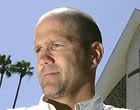
It might seem strange that I would offer up an internecine squabble on these pages, but the Kirk house is currently debating the issue, and it gave rise to a couple of appropriate thoughts regarding the debate herein.
Calvinists and Arminians disagree on several things, but the meaty part is over predestination vs free will. "Did God decide 'in the beginning' which of us humans would be saved and which condemned to hell." If he made such a decision, and there is plenty of solid scripture to back up that POV, then how can there be such a thing as free will. If no free will, then how can we ascribe personal responsibility to any act or person. If no free will, why even contemplate the issues of good vs evil or God vs no God? Last element of the set up: Both sides of the C vs A debate pretty much agree that there is no way to resolve the scriptural conflict this side of heaven. You pretty much select free to choose or God already chose by faith.
By now you are probably miles ahead of me in thinking how this applies more broadly to question posed here. Hopefully, however, I will surprise at least 10% of the faithful readers of this blog with my main epiphany. The Bible stands alone among all resources produced by humans in that it claims to provide us with Truth. Other religious texts might come close, but none make the audacious claims about being a depository of all Truth that the Bible does. As a result, the OT has proclaimed Truth for 4000 or so years with the NT now adding to (but not subtracting from) OT Truth for over 2000 years.
One of my other blogs is humbly titled "The Truth About Everything." I intended that to be audacious, over the top, intentionally rediculous, etc. Having named the blog thus, it would be fair for everyone and anyone who visits there to challenge every assertion, including the name. Some might say that I have created a lightening rod. If I had entitled it "Randy's Musings," it wouldn't have been such a direct challenge to visitors.
Fast forward 1 year or 20 years or 50 years, my postings of the Truth would likely seem silly, off kilter, or even have proven to be the opposite of truth. If I were still writing Truth, readers would and should point to my past error in evaluating my current assertions.
Back to the Bible. It is an easy mark for those who wish to comment on its postings. There are so many postings written by so many people that many deem it remarkable that there are no contradictions (or at least none that can't be overcome by sometimes tortuous means.) But on the whole, I think a fair jurist would say that the lack of (whoops) significant contradictions is rare for a work of this magnitude, scope, authorship, etc.
When compared to any other source of truth claims, the Bible is the only one who doesn't have the option of changing its words or statements. We humans may change our interpretation, and like any observable thing, humans will have different takes on what they see, hear, read, smell, taste, etc.
Which brings us back to Calvin and Armin, and to free will and predestination (insert also omniscience and determinism.) We either choose one or the other by faith, or we have been predisposed to our destiny regarding these issues by God or by wiring. And if this isn't the most complex philosophical question facing humans that has real consequences for living, I don't know what would be more so.

 to be fair and balanced here, so I report on the LA Times religion editor, who as a self-described "serious Christian," lost his faith while writing about religion in Southern California. He seems to have been most troubled by the Priest scandals and the excesses of the leadership at Trinity Broadcasting Network.
to be fair and balanced here, so I report on the LA Times religion editor, who as a self-described "serious Christian," lost his faith while writing about religion in Southern California. He seems to have been most troubled by the Priest scandals and the excesses of the leadership at Trinity Broadcasting Network.